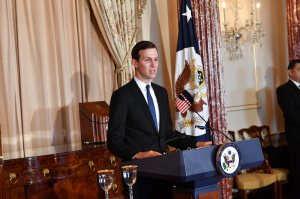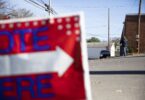By Matt McKinney | Spotlight PA

Pennsylvania’s teacher pension system has more than $200 million pledged to a fund with ties to a long-troubled, high-profile New York City skyscraper linked to the family of President Donald Trump’s son-in-law, Spotlight PA has learned.
Before the coronavirus pandemic, critics told Spotlight PA the investment could face challenges because the building has struggled to attract tenants. Now, the fund — and many of those like it — face growing headwinds as COVID-19 devastates the global economy.
In October 2018, trustees of the Pennsylvania School Employee Retirement System voted to invest in Brookfield Strategic Real Estate Partners III, a fund touted in documents as an “attractive investment opportunity” for those looking to bet on various real estate sectors.
But they were apparently unaware of the fund’s stake in the troubled office building.
Two months earlier, a subsidiary of the fund had agreed to pay 99 years of rent in advance on 666 Fifth Ave. in New York City, just before a mortgage of $1.4 billion fell due.
White House senior official Jared Kushner and his family reportedly struggled for years to fill vacancies at 666 Fifth Ave., which they bought in 2007 shortly before the Great Recession. The $1.8 billion price tag was widely hailed as the priciest office purchase in New York City’s history.
The 1.5 million-square-foot building, which was rebranded with a new address, remains the Kushner Cos.’ headquarters.
“It seems to me, as a fiduciary who was asked to approve it, I shouldn’t be hearing about it from an investigative reporter,” State Treasurer Joe Torsella said in an interview.
Steve Esack, a spokesperson for the pension system, declined to comment on the property, citing a contractual ban and agency policy that “prohibits it from commenting on individual holdings within private markets portfolio funds.” He did say the system’s “diversified strategy,” which includes real estate, “has helped PSERS manage risk in good economic times and limit losses in bad economic times as the world is experiencing now.”
A spokesperson for Brookfield Asset Management, which now manages the private real estate fund, declined to comment, as did a representative of the Pennsylvania State Education Association, which represents roughly 187,000 school employees.
Torsella, one of two trustees to vote against the investment, said he did so because of general philosophical concerns. He did not recall any discussion about the fund’s connection to the property. The investment is “not a good look” for a number of reasons, he said, including its links to a sitting government official, the lease terms, and what he called a lack of transparency.
The public memo and consultant’s report provided to trustees at the time of the vote did not disclose the fund’s connection to the property, which threatened the Kushner real estate business because lagging revenue made it hard to repay loans.
“With the kind of investment that we’re talking about, the entire process of it, from start to finish, is covered with an opacity that serves no one’s interests except the Wall Street managers,” Torsella said. “These are fundamentally, in a sense, no-bid deals.”
The PSERS spokesperson, Esack, said public memos for private market investments do not list underlying companies or properties for contractual legal reasons.
Torsella said the property’s risks are at a minimum “reputational,” because would-be tenants might be scared off by past troubles at 666 Fifth Ave., which was mentioned in the Mueller Report.
“Maximally, there could be more,” Torsella said.
PSERS is among the public employee pension systems facing major challenges after years of inadequate contributions and lower-than-expected investment returns. At the end of fiscal 2019, the system carried an unfunded liability of $44.1 billion.
Under pressure to overcome 10-figure shortfalls, funds historically have embraced “riskier and alternative investment strategies” to catch up, according to a 2018 report by a bipartisan state pension reform commission tasked with recommending fixes for PSERS and the State Employees’ Retirement System.
Brookfield Asset Management closed the fund to investors last year at $15 billion. Its more than 150 investors include assorted pension plans and sovereign wealth funds, although most have not been identified publicly. The fund bills itself as “acquiring high-quality real estate assets on a value basis.”
“These targeted investments are potentially problematic because the funds are by necessity secretive, since their success depends on having knowledge or strategies that other investment firms don’t have,” Andrew Biggs, a resident scholar at the conservative American Enterprise Institute think tank, said in an email. “But it also means that a potential investor in that fund may not have great knowledge of what the firm is doing.”
He added: “I can’t say with any knowledge that this is a good or bad investment. But in general I don’t have great confidence in pension funds’ ability to pick and choose investments rather than simply to hold diversified assets.”
Real estate investments were roughly $6.1 billion of PSERS’ total portfolio at the end of fiscal year 2019.
Esack, the PSERS spokesperson, said the agency’s “public and private real estate holdings are important assets for our diversified investment strategy. The real estate program (10% of the total fund) is designed to create the highest possible risk-adjusted returns over time through closely controlled and vetted processes.”
PSERS has invested in two other Brookfield funds that have performed well to date, agency records show.
But experts expect the pandemic to be a drag on real estate markets, along with other sectors of the economy. A recession would likely drive down office real estate demand, though low interest rates could help mitigate the effects, analysts said.
A March report by S&P Global Ratings suggested the coronavirus could pose challenges to real estate investment trusts, according to credit analyst Ana Lai. These are companies that pool investor money to buy and operate income-producing properties.
The outlook for Brookfield Property Partners — which owns a minority stake in Brookfield Strategic Real Estate Partners III and controlled the fund at the time of the lease agreement — was revised to negative this month.
Spotlight PA is an independent, nonpartisan newsroom powered by The Philadelphia Inquirer in partnership with the Pittsburgh Post-Gazette and PennLive/Patriot-News. Sign up for our free weekly newsletter.
Spotlight PA receives funding from nonprofit institutions and readers like you who are committed to investigative journalism that gets results. Give a gift today at spotlightpa.org/donate.







